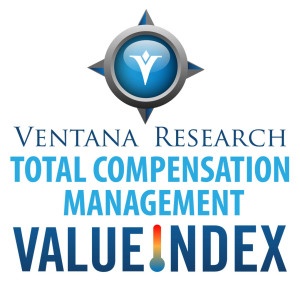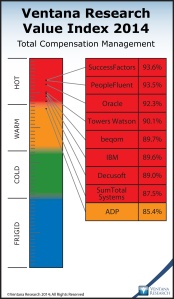Now available from Ventana Research is our Value Index on Total Compensation Management for 2014. Total compensation management directly addresses one of an organization’s largest investments – employee pay. As such it is a critical activity for supporting other human capital management and talent management processes.
 Our Value Indexes are informed by more than a decade of analysis of how well technology suppliers and their products satisfy specific business and IT needs. For each we perform a detailed evaluation of product functionality and suitability to task in five categories as well as of the effectiveness of vendor support for the buying process and customer assurance. In this case the resulting index gauges the value offered by each vendor and its products in supporting total compensation management, which is necessary for running an organization efficiently and managing its largest controllable expense.
Our Value Indexes are informed by more than a decade of analysis of how well technology suppliers and their products satisfy specific business and IT needs. For each we perform a detailed evaluation of product functionality and suitability to task in five categories as well as of the effectiveness of vendor support for the buying process and customer assurance. In this case the resulting index gauges the value offered by each vendor and its products in supporting total compensation management, which is necessary for running an organization efficiently and managing its largest controllable expense.
Total compensation management has evolved significantly over the four plus years in which we have published a Value Index on the topic. From both conversations with reference customers for this report and analysis from our benchmark research on this topic we conclude that it is still evolving as practice in organizations today. The research shows that spreadsheets are still the primary tool for compensation planning in one out of four (26%) organizations and used often by an additional one-third (35%). But it also shows that others use stand-alone compensation management products and still others have integrated the process and technology within a human capital management application suite. Regarding the latter our benchmark research shows that three in four (76%) participating organizations said that it is important or very important to have compensation management and talent management systems integrated; in addition lack of integration to talent management is the most widespread impediment to successful compensation management, selected by two-third (66%) of participants.
For compensation management to be fully effective in today’s organizations it also must include several next-generation technologies in use in other parts of human capital management. The most important of these is analytics that help managers make better compensation decisions. The increasing importance of compensation analytics is evident in our human capital analytics benchmark research, which reveals that the metric most often used by executives (75%) today is compensation.
Mobility and collaboration are becoming important to total compensation management. Mobile capabilities are found in six of the compensation management products we reviewed for the Value Index; our human capital analytics research reveals growing adoption: one-third of companies are using mobile technology for these analytics today, and more than half (52%) intend to use it. Collaboration, though less widely adopted, is important in larger organizations to enable managers in various roles to comment on the correct total compensation for their employees.
The 2014 edition of the Total Compensation Management Value Index evaluated both products that are part of a larger suite of talent management products, which was the most common type, and others that stand alone. In general, we find several benefits to a suite. Among them are analytics integrated with other talent management applications, a common user experience and centralized administration, which make ownership and adoption somewhat easier for the customer.
 Among the compensation management products we evaluated, all cover core compensation management of salaries or hourly wages as well as merit pay, bonus pay and some kinds of incentive pay. Functionally, the differences among the nine products appear in areas such as support for complex plan rules, the number of geographies covered and the ability to support various types of compensation plans (for example, focal vs. anniversary plans) as well as the implementation of next-generation technologies. Some products offer more effective application management tools and better product documentation for support and business case development. While we recognize that some organizations may need only basic salary or hourly wage capabilities, we believe that many organizations with 1,000 or more employees will require more advanced functionality. Therefore we based our overall assessment partly on the array of capabilities that comprise total compensation management.
Among the compensation management products we evaluated, all cover core compensation management of salaries or hourly wages as well as merit pay, bonus pay and some kinds of incentive pay. Functionally, the differences among the nine products appear in areas such as support for complex plan rules, the number of geographies covered and the ability to support various types of compensation plans (for example, focal vs. anniversary plans) as well as the implementation of next-generation technologies. Some products offer more effective application management tools and better product documentation for support and business case development. While we recognize that some organizations may need only basic salary or hourly wage capabilities, we believe that many organizations with 1,000 or more employees will require more advanced functionality. Therefore we based our overall assessment partly on the array of capabilities that comprise total compensation management.
Based on these evaluation criteria, the top vendor in our 2014 Total Compensation Management Value Index is SAP SuccessFactors, followed closely by PeopleFluent. This finish mirrored the ratings in the 2012 Total Compensation Value Index. Eight of the nine vendors in this year’s Value Index we rated Hot; this close grouping indicates the general maturity of this market. In this year’s Value Index following the two leaders are those also rated Hot who are: Oracle, Towers Watson, beqom, IBM, Decusoft and SumTotal Systems, and then ADP who was rated Warm. Two new vendors to this Value Index are Decusoft and Towers Watson, and then beqom who was previously known as Excentive.
In today’s competitive business and employment environment, more companies see compensation as a differentiator for their employer brand and want technology that can help them advance their compensation programs to attract and retain top talent. Next-generation technologies such as mobility and analytics enable employees to understand the total value of their compensation packages. As compensation plans become more complex, the need for capabilities like integrated budgeting and modeling become greater so finance departments can ensure that plans adhere to budgets. Furthermore, integrating compensation and performance management, as well as other key talent management applications, helps businesses judge and motivate their top performers. If these critical issues affect the performance of your own business, I urge you to utilize our 2014 Total Compensation Management Value Index for insights on how to address them most effectively.
Regards,
Ventana Research











